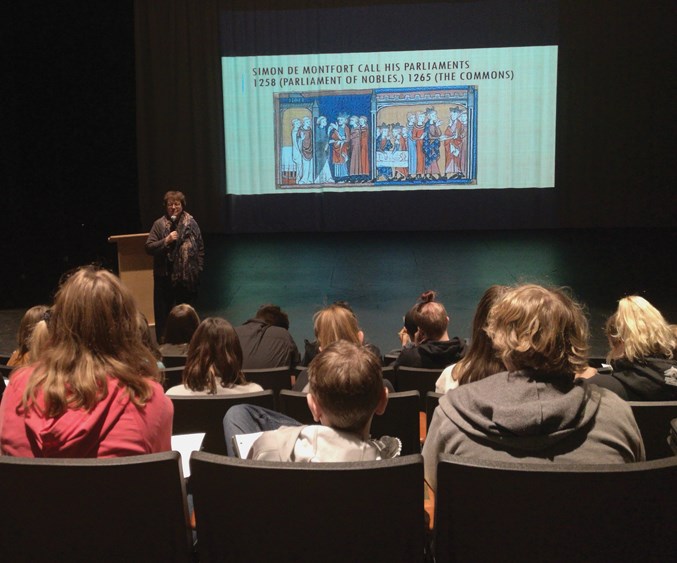Canadian independent Senator Paula Simons paid a visit to R.F. Staples School Social Studies students Sept. 27, teaching them about the upper house of Parliament, how it works, where it started and why it still exists, while also introducing them to the uphill battle that is amending a bill.
The Grade 9 classes had already studied Bill C-69 which received royal assent and became law June 21.
“It was really only when it got to the Senate that people started getting really angry about it publicly,” Simons told the students.
As much as a lesson in the legislative process, this was a lesson in contention and the difficulties of a seemingly one-sided issue.
Simons explained that the original bill needed a lot of amendments, so hearings were held in Vancouver, Calgary, Fort McMurray, Saskatoon, Winnipeg, St. John’s and Quebec — the first time they had been done outside of Ottawa.
Conversations included almost every industry sector, as well as environmentalists. Simons said her own concern was that the bill made no mention of the public interest, but focused on the potential negatives of any energy project.
The bill was eventually accepted in the House of Commons with 99 amendments out of the original 188. Conservatives were calling it the “no-pipeline bill,” while Liberals claimed the amendments were proposed by Conservatives even though they had been accepted by the whole chamber (the majority are non-partisan, so independents).
A lot of debate has surrounded the Senate as a whole recently. This gives everyone a chance to see who exactly sits in the chamber.
Simons, previously a journalist with the Edmonton Journal, spent many years as a critic of government.
“An Ottawa newspaper did an investigation and said I’m one of the most likely to vote against the government. I don’t think I’m really that contrary,” said Simons, adding that she makes decisions based on what she thinks.
A student asked her to whom she feels accountable. Simons said to Albertans. A later conversation with the senator confirmed that she believes this province to be a very diverse one in terms of opinions, and not the unified bloc it is assumed to be in Ottawa. This only makes the issue of accountability that much more difficult, but only because it is a political consideration.
“I’m not accountable in the sense that I can’t be de-elected,” she said.
She continued: “Because I made myself so available on Twitter and on Facebook, I feel accountable to the same people who were my readers when I worked for the Edmonton Journal ... my power as a columnist only lasts as long as people believe what I say.”
This is how she finds out who those people might be:
“Going to the schools would give me a snapshot of the community demographics and a sense of what mattered in the community,” she said.
This sort of public engagement is also a way to “keep a finger on the pulse” of Alberta, keep track of what matters and how communities are changing, she added.
Simons is also one of the few to live-tweet from the Senate to cover a gap in reporting.
“This started for me when we were doing the debate on whether or not to approve the government’s back to work order for postal workers last November. … I didn’t come into that debate with a strong opinion, and there were so many smart senators who had expert knowledge … I just naturally did what I did at Legislature, which was live tweeting.
“This really mattered, this is an issue that hits home for people, it’s not just a philosophical argument. Everybody wants to know what was happening, that’s something I could do. I could be a senator who tweets.”
Conservative Party leader Andrew Scheer wants to end the independent experiment, and appoint partisan senators. This was his position when he was elected leader of the party and was confirmed again by his staff just recently.
In 2013, Stephen Harper took the issue to the Supreme Court, which responded that it could be done with unanimous consent from the House of Commons, the Senate and every province.
The NDP still holds on to the abolition idea.
At its origin, it was supposed to be a place of “sober second thought,” although Simons explained to the students that John A. Macdonald might have said that because he himself wasn’t sober very often.
It is seemingly very arbitrary to appoint public servants in Parliament without the evident consent of the population. Simons raised some questions about the chamber’s attributes on Friday to a pool of soon to be voters.



